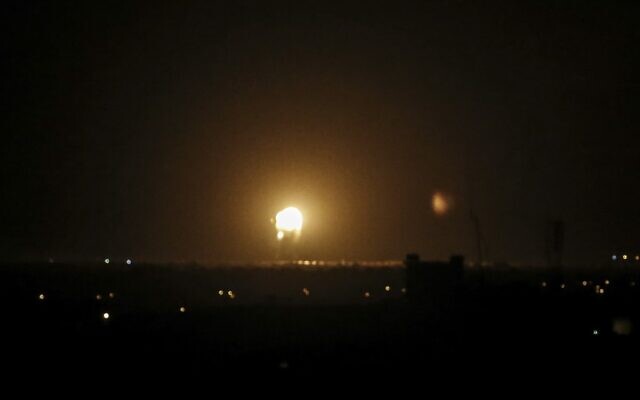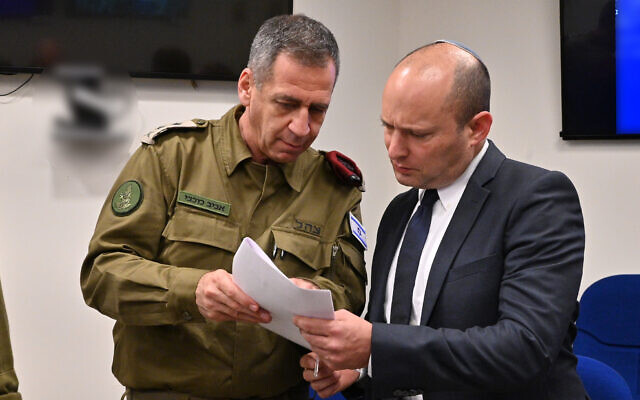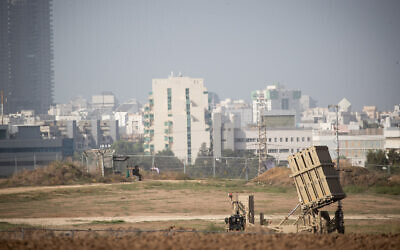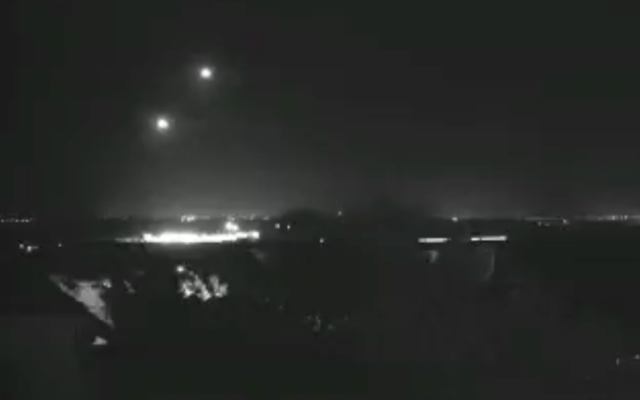Defense minister issues warning after rocket attack leads to overnight wave of IDF strikes on Hamas targets in Gaza; terror group says strikes won’t change balance of power

Defense Minister Naftali Bennett on Wednesday warned that Israeli forces would respond to rocket fire regardless of whether it hits a target or not, projecting a hard-line approach after tensions along the border heated up overnight.
Israeli forces carried out two rounds of airstrikes on Hamas targets in the Strip Wednesday morning, in response to a rocket shot from the enclave Tuesday night.
“A rocket that doesn’t hit will be judged in the same way as one that does,” Bennett wrote on Twitter. “Those that fire — will suffer blows.”
Despite the pronouncement of the zero-tolerance policy, Israel allowed a mortar fired at the Eshkol region from Gaza on Monday night to go unanswered.
Bennett, a nationalist security hawk, has in the past criticized the government’s handling of violence from Hamas-run Gaza, demanding a harsher response, both when he served in the coalition and later.

While Israeli officials have often warned that any attacks will be met with a response, observers have noted that Israel sometimes allows sporadic fire to pass without retaliating to avoid ratcheting up tensions. The severity of Israeli strikes is also often guided by the damage caused by Gazan rockets or if they target larger population centers, an unspoken policy criticized in the past by Bennett.
Bennett was named interim defense minister by Prime Minister Benjamin Netanyahu earlier this month, but the premier reportedly admitted he only appointed the New Right lawmaker to prevent him from joining forces with Netanyahu’s rival, Blue and White leader Benny Gantz.

On Tuesday night, two rockets were fired toward Israel, triggering alert sirens in the southern town of Sderot and surrounding communities.
One of the projectiles was shot down by soldiers operating the Iron Dome missile defense system, the army said. The second appeared to strike an open field in the Sha’ar Hanegev region of southern Israel.
No injuries or damage were caused by the rockets, though one woman was lightly injured when she fell while running to a bomb shelter.
Fighter jets responded by hitting Hamas targets, including one site “for the production of arms,” just after midnight and again before dawn, the Israel Defense Forces said.
Moments before the IDF strikes began, Netanyahu warned terror groups in Gaza they were making a “serious mistake” by firing the two rockets at Israel on Tuesday night.
“If someone in Gaza thinks it’s safe to attack us after Operation Black Belt — they’re making a serious mistake. We will respond aggressively to any attack against us, and will continue to ensure the security of Israel on all fronts,” Netanyahu said in a statement, referring to the 48 hours of intense fighting between the IDF and the Palestinian Islamic Jihad terror earlier in the month.
A spokesperson for Hamas responded to the strikes, saying that they were insignificant.
“If the Israeli enemy thinks that the bombing of Hamas posts will create a new equation in the fight between us, it is wrong. Hamas and its military arm have the capabilities to bring about further failure of the Israeli occupation in the struggle,” said Fawzi Barhoum, according to Channel 13 news.

During the two-day skirmish with Islamic Jihad earlier this month, Israel and Hamas refrained from fighting each other, leading some to predict an opening for future cooperation on a long-term ceasefire agreement.
Since then, in a rare shift, Friday protest marches were called off along the Gaza border for two weeks in a row. The move — being only the third and fourth time the weekly demonstrations were canceled since they began in late March 2018 — was seen as marking an attempt by Gaza’s Hamas rulers to avoid fresh confrontation with Israel.
A Qatari official said Monday that aid money would be handed out on Wednesday to Gaza residents, as part of an unofficial ceasefire agreement between Israel and terror groups in the Strip.
Qatari envoy Mohammed al-Emadi said 70,000 poor families will each receive $100 from postal banks in the Strip. In the past year, these banks have on several occasions distributed $100 Qatari grants to tens of thousands of needy families in the coastal enclave.
As reported by The Times of Israel
